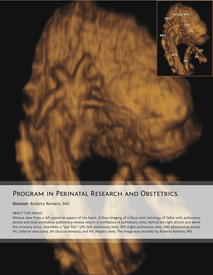You are here: Home > Program in Perinatal Research and Obstetrics
Program in Perinatal Research and Obstetrics
Director: Roberto Romero, MD
The Program in Perinatal Research and Obstetrics (PPRO) conducts clinical and laboratory research on maternal and fetal diseases responsible for excessive infant mortality in the United States. The Program focuses on the mechanisms of disease responsible for premature labor and delivery, with particular emphasis on the role of subclinical intrauterine infection and inflammation. The prenatal diagnosis of congenital anomalies is also a major area of interest.
The Perinatology Research Branch was created by Public Law (1993) to address the causes of excessive infant mortality in the United States. The Branch, now called the PPRO, uses a multidisciplinary approach to study complications of pregnancy, which include the disciplines of Maternal-Fetal Medicine, Neonatology, Placental Pathology, Perinatal Epidemiology, and High-Dimensional Biology (genomics, proteomics, metabolomics, and computational biology), as well as Immunology, Microbiology, and Nanomedicine. The Program is currently housed in Detroit, Michigan, on the campus of Wayne State University and at the Detroit Medical Center. The location is appropriate because of high perinatal and infant mortality in the city, as well as the contribution of ethnic social disparities to adverse pregnancy outcome. The PPRO provides state-of-the-art prenatal care to women enrolled in NICHD protocols and has made major contributions to the diagnosis of congenital anomalies and the understanding of the mechanisms of disease in premature labor/delivery and preeclampsia.
Preterm birth is the leading cause of perinatal mortality and morbidity worldwide and affects 12% of all pregnancies in the United States. Several lines of evidence suggest that the administration of vaginal progesterone to patients with a short cervix may reduce the rate of preterm birth. Last year, in a randomized clinical trial in 44 centers, PPRO members reported groundbreaking results indicating that progesterone was effective in reducing the preterm birth rate, as well as neonatal morbidity. Continuing this line of investigation this year, they conducted an individual patient data (IPD) meta-analysis, which included five randomized controlled trials, to evaluate the efficacy and safety of vaginal progesterone for the prevention of preterm birth and neonatal morbidity and mortality in women with a sonographic short cervix in the midtrimester, and also to determine whether clinical benefits were associated with the administration of vaginal progesterone in singleton and twin pregnancies. They reported that vaginal progesterone substantially reduced the risk of delivery in the 27th to 34th weeks of gestation, with reductions in the rates of infant morbidity/mortality, respiratory distress syndrome, neonatal birth weights of less than 1500g, and admission to neonatal intensive care units. Based on these findings, they recommend that doctors screen pregnant patients with ultrasound of the cervix routinely at 19 to 24 weeks of gestation. It has been estimated that the routine implementation of universal screening of all pregnant women in the United States and the administration of progesterone to those with a short cervix can result in a savings of $500 million per year in the United States alone.


